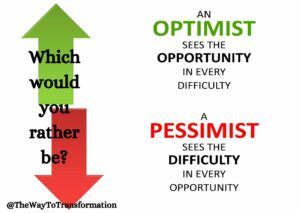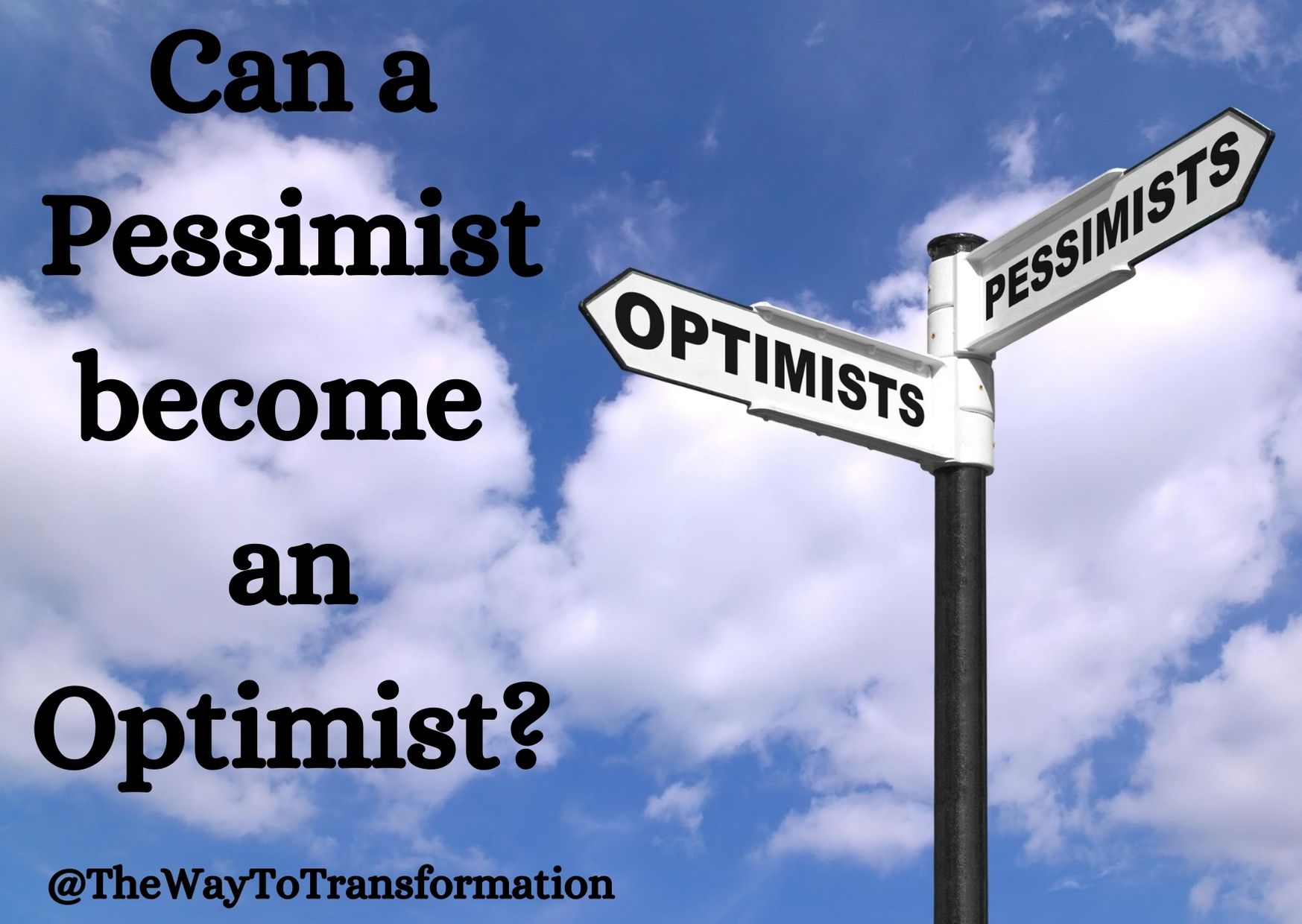Is it possible do you think, can a pessimist become an optimist? Can they change that much?
Table of Contents
Google search says:
- Optimists tend to feel happier in general, and pessimists tend to feel less happy than that. But if you’re a pessimist, it’s always possible to learn how to become an optimist. Sometimes enduring a crisis provides you with just the right motivation to do that.
While some individuals are born with sunny dispositions, others are more prone to negative outlooks. Many factors come into play:
Childhood experiences
Temperament
Environment
Economic status
Genetic predisposition
While these are all valid reasons as to why one person might be more positive and optimistic than another, there is one factor which may have the power to transform those reasons – the power of choice. But is that enough
Optimism as a Choice
Given a set of negative circumstances, some with a negative mindset might view this as an all or nothing, catastrophic event. However, those individuals with a positive, optimistic mindset might feel the impact of the negative circumstance, evaluate their choices, and then go on to make the best decision in their control. Those with positive mindsets of optimism are more apt to also choose a more constructive and useful attitude.
While we may not be able to change our circumstances, we can change our reaction and attitude toward those very same circumstances.
Characteristics of an Optimist vs. a Pessimist
The pessimist might say, “How dreary, it’s raining,” while the optimist might say, “Thank goodness for this rain; the plants and flowers need it.”
A few of the differences between an optimist and a pessimist:
Optimist Traits
Sees a problem as a challenge
Has a “can-do” attitude
Laughs and smiles frequently
Has a positive upbeat disposition
Expects all to work out for the best
Is determined to succeed
Pessimist Traits
Sees a problem as a catastrophe
Questions their own abilities
Does not laugh and smile much
Has a negative, bitter disposition
Expects things to go wrong
Gives up easily
How to Spot A Pessimist
You will know a pessimist right from the start; however, in some cases, the pessimist’s negativity might be a bit more subtle. Sometimes it may take time to wonder exactly what it is about a person that makes you uneasy. Sometimes a pessimist will come out blatantly and drop their negativity like a bomb. Other times, you walk away feeling worse than when you first encountered the pessimist, but not quite sure why.
A pessimist sometimes also uses sarcasm and wit to disguise their cynicism. It may be a need for bolstering their own self-esteem to make sarcastic comments under the guise of wit. It is also possible they are pessimistic about everything in life – theirs, yours, and everyone else’s.
How to Spot an Optimist
An optimist is different than a Pollyanna type personality. A Pollyanna type personality sees everything with rose-colored glasses; everything is wonderful – even the not-so-wonderful aspects of life.
An optimist tends to have a more positive energy and aura. Whenever you are around an optimist, you walk away feeling better than when you first encountered the optimist. They are always finding the lighter side of things, are more jovial, laugh and smile more.
Even in the face of adversity, an optimist can say, “Look at this challenge in front of me; I can’t wait to find a creative solution.” A pessimist will waste time and energy complaining, whining, and feeling sorry for themselves rather than look for that creative solution.
Optimism as A Way of Being
An optimist by nature is born with a positive, upbeat temperament. It could stem from a lovely upbringing, a genetic predisposition, great childhood, or all the above.
Optimism as A Strategy
An optimist may also be an ordinary individual who chooses to be optimistic. It is a conscious effort moment by moment in their everyday lives. He/she may be in tune with spirituality, consciousness, or is a seeker of knowledge and wisdom. Being optimistic is a possibility he/she has created for themselves by making a conscious choice to do and be so.
A pessimist might be aware of the power of choice to change his/her attitude to a more positive demeanor. However, they choose to remain the same. The sound of their own voice complaining, feeling sorry for themselves, or getting attention for their woeful tales is enough to keep them satisfied.
Thankfully, optimism is a learned habit. A pessimistic type personality can learn how to be optimistic and put the practices of positive thinking to work in their lives. With a bit of effort and consciously choosing the lighter side of situations and circumstances, a pessimist can learn the skills, habits, and traits of being more optimistic. They simply must choose to.
How a Pessimist can become More Optimistic
Brain Training
While changing any part of our personality is never an easy task, it is doable. An individual must want it though. Chances are, telling a pessimist he/she can change their outlook and change their life will most likely be met with some cynicism. After all, it’s a pessimist we are talking about; however, if someone makes the decision on their own – say perhaps seeking to find his/her purpose in life or finding more joy – there is certainly more of a chance of success.
Through practice and some brain training techniques, a pessimist can most certainly become more optimistic.
Focus
What a person focuses on expands. Constantly focusing on what is wrong and what does not work is a surefire way to get more of the same; situations where just about everything can and does go wrong. There are plenty of positive circumstances in life to focus on:
What does go right in your life?
Counting your blessings
What do you have to be grateful for?
What does work?
Perception
When faced with adversity, is there some semblance of a silver lining within that circumstance? Can a pessimist view an ending as a beginning or as a lesson learned? Can a pessimist find the deeper meaning instead of looking through a negative lens?
Internalizing
While an optimist views the proverbial glass as “half-full” and a pessimist views the glass “half-empty,” what if a pessimist did not internalize circumstances as personal to themselves? In other words, what if something happened simply because it happened and not because the pessimist has “bad luck?” Moving away from the woe-is-me way of thinking opens the door to a broader view and removes the unfortunate situation as having any meaning to the pessimist themselves.
Storytelling
Another way a pessimist can move away from negative thinking is to tell themselves and others different stories. Instead of seeing only the story surrounding the circumstance as all black (for example, a pessimist might say they have no luck, everything always happens to them, everybody else gets to get what they want), a pessimist can opt to see it in black and white. Something happened because something happened – no story attached.
Changing the focus and perception along with not internalizing and telling a new story, a pessimist is able to see the glass as half-full and have a life full of optimistic results.
Thank you for visiting, if you enjoyed this post, please share.
Comments and questions welcome.
